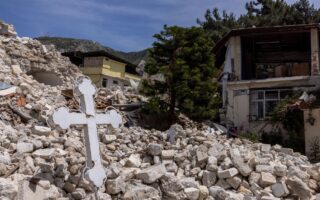Working together for the good of the country

I recently asked an opposition SYRIZA official to name one good thing the New Democracy government has done these past four years. He paused for a few seconds and then tried to dodge the question, basically refusing to say anything positive about Kyriakos Mitsotakis’ term in office.
How can the country move forward, however, when political rivals are constantly being treated like mortal enemies? How, for example, can a SYRIZA government continue the excellent work done in digitizing state services if it refuses to acknowledge it. The leftist opposition is so bent on opposing ND that it even voted against important defense agreements with France and the United States, which had been set into motion by the previous government under its leader, Alexis Tsipras.
ND is not much better. It inherited a nest egg of more than 30 billion euros from SYRIZA that gave the country much-needed help under the conservative administration, yet instead of recognizing the achievement, ND accuses SYRIZA of bleeding the middle class dry.
But Greece needs to turn the page; it needs its political parties – those who have governed, at least – to work together. It needs every new government to stop dismantling the achievements of the previous one. Yet the political system remains fixated on the past. One exception was the coalition between erstwhile archrivals ND and PASOK with Antonis Samaras and Evangelos Venizelos, which demonstrated that the differences can be bridged. The fact is that after a decade of hard political battles, punishing austerity and enormous sacrifices, the country needs normalcy.
The ND government successfully dealt with multiple challenges – Turkish provocations, the pandemic and the Ukraine war – and is now ready for the battle for investment grade. True, people expected more reforms – in justice, the state and in income equality – and were disappointed by the manipulation of the institutions, as demonstrated by the wiretapping affair. Greece nevertheless made progress, and especially in the economy. The country has decreased its reliance on Russian natural gas, inflation is lower than in many other European countries, the budget closed with a primary surplus of almost 300 million euros in 2022 and the Greek debt as a percentage of gross domestic product is now smaller than Italy’s. On the other hand, the country’s productive model has not changed and imports are still larger than exports, which are however rising. Unemployment has also decreased by some 400,000 people while real incomes appear to be edging into positive territory for most citizens.
The country’s prospects are even better. Tourist arrivals are expected to be larger than last year, with some estimates seeing an increase in revenues to 20 billion euros from €18 billion in 2022. The country will also continue receiving significant resources from the EU’s Recovery Fund and the rate of economic growth is expected to reach 3% in 2023 from initial estimates of 1-1.5%. If a stable government also emerges from the double election, we can be confident of major investments in real estate, tourism and energy in particular, once the green light is given for an investment grade rating.
Greece will not become Scandinavia overnight, but it is very close to success. And success can only be achieved when you keep putting your best foot forward. We must stop complaining about everything. We must all help the country achieve its potential.





